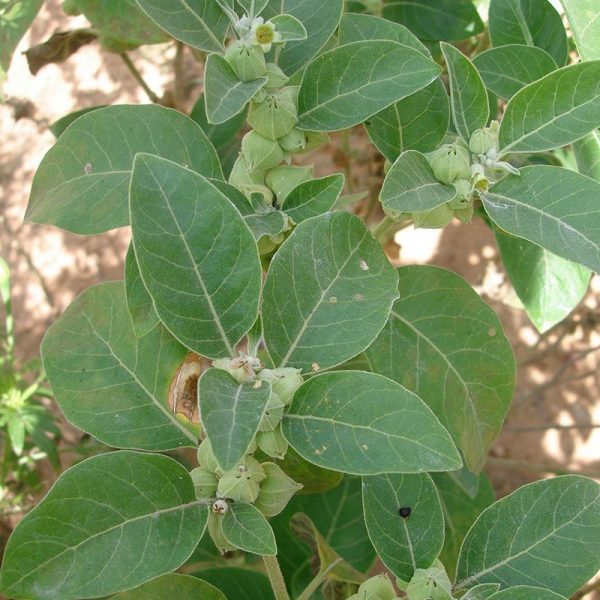Men, listen up! Are you using herbs for your fertility? If not, maybe it’s time to give them a try. Herbs can be amazing allies along with a healthy diet and lifestyle to help turn around fertility challenges like low sperm count or motility, or high stress. For example, the herb, Ashwagandha (Withania somnifera) has been found clinically to improve sperm quality and reduce fertility problems in men.
Ashwagandha Rejuvenates Mind and Body
Ashwagandha is one of Ayurveda’s finest herbal treasures. Translated from Sanskrit, Ashwagandha literally means “smell of a horse” as it is believed to keep the system virile and strong like a stallion. Ashwagandha is a superior adaptogen herb at the same level as ginseng and offers similar benefits. As an adaptogen, Ashwagandha is an herb that supports the body in its natural efforts to rebalance itself. It supports nervous system function, builds stamina, and can enhance libido for men and women.
For male fertility, research shows exciting news about Ashwagandha.
- A 2013 pilot study published in Evidence-Based Complementary and Alternative Medicine finds men with oligospermia (low sperm count) experienced a 167% increase in sperm count, a 53% increase in semen volume, and 57% increase in sperm motility after using an Ashwagandha root extract as compared to placebo.
- A 2011 study published in Evidence-Based Complementary and Alternative Medicine reveals treatment with Ashwagandha relieves stress, improves antioxidant levels, and enhances semen quality in men with stress-related infertility. This same study showed a 14% pregnancy rate for the partners of the subjects studied.
- A 2010 study published in Fertility and Sterility shows Ashwagandha decreases free radicals, improves semen quality, and helps regulate important hormones like testosterone, follicle stimulating hormone (FSH), luteinizing hormone (LH), and prolactin (PRL) in the male system.
Add Ashwagandha to your fertility program today!
Used extensively as a rejuvenative herb in Ayurveda, we have a lot to gain from Ashwagandha in the natural fertility world. I find it’s one of the best tonics for men and women dealing with sexual burnout, a common problem encountered when trying to conceive.
Further, if you’re feeling stressed about your fertility, Ashwagandha gives your body more power to cope. It aids restful sleep, relieves anxiety and tension, and helps revitalize the hormonal system. Men and women I work with feel and love the benefits! A good daily dosage is 30 – 60 drops, 3 times a day.
Consider learning more about FertilicaTM Ashwagandha Extract here…
For the best results, use Ashwagandha along with a Male Fertility Diet, regular exercise, and healthy lifestyle. For most fertility challenges, natural therapies need at least 3-6 months to experience the benefits. Give your program time and be consistent. We offer Male Fertility Consultations if you want step-by-step guidance and support. Nutritional and herbal therapies take time to work, but the benefits are long-lasting and come without long lists of side effects or warnings.
Have you used Ashwagandha for your fertility? Share your story with us.
- Saunders, J. (2017). What is Ashwagandha? Retrieved from: https://chopra.com/articles/what-is-Ashwagandha
- Mohammad K., et al. (2010, Aug.). Withania somnifera improves semen quality by regulating reproductive hormone levels and oxidative stress in seminal plasma of infertile males. Fertility and Sterility. Volume 94, Issue 3, 989-996. Retrieved from: https://www.sciencedirect.com/science/article/pii/S0015028209010140
- Vijay R., et al. (2013). Clinical Evaluation of the Spermatogenic Activity of the Root Extract of Ashwagandha (Withania somnifera) in Oligospermic Males: A Pilot Study. Evidence-Based Complementary and Alternative Medicine; Article ID 571420, 6 pages, doi:10.1155/2013/571420. Retrieved from: https://www.hindawi.com/journals/ecam/2013/571420/abs/
- Mahdi, A., et al. (2011). Withania somnifera Improves Semen Quality in Stress-Related Male Fertility. Evidence-Based Complementary and Alternative Medicine; Article ID 576962, 9 pages. Retrieved from: https://www.hindawi.com/journals/ecam/2011/576962/abs/





